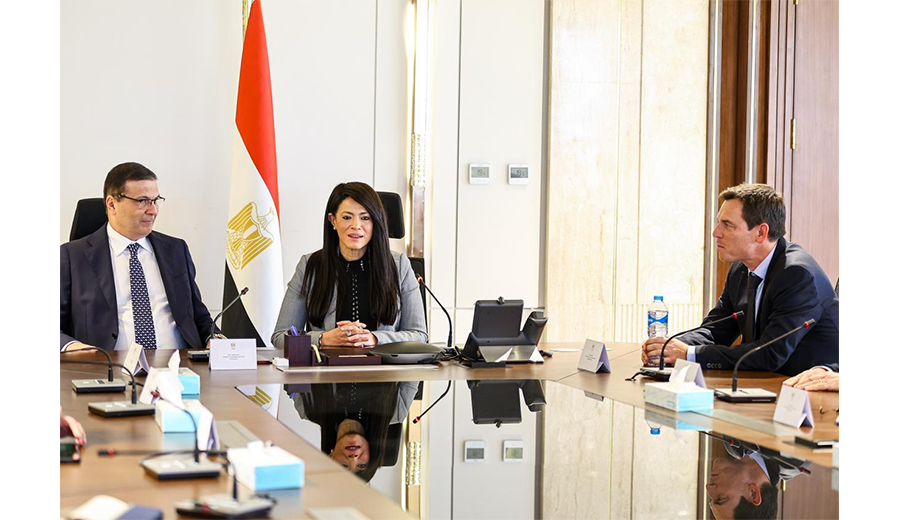On behalf of Egypt’s President Abdel Fatah Al-Sisi: The Minister of Planning reviews the Egyptian experience to confront the repercussions of the Coronavirus on the Egyptian economic sectors, especially tourism, at the Paris Peace Conference

13 November 2020
Egypt’s Minister of Planning and Economic Development, Dr. Hala El-Said participated today, on behalf of Egypt’s President Abdel Fatah Al-Sisi, in the discussion session entitled "Changing the Facade of Tourism and International Travel" at the end of the third session of the Paris Peace Forum, which was held from 11 to 13 November this year, through video conference technology.The current session of the forum focused on projects and initiatives around the world, which aim to address the emerging coronavirus crisis and improve resilience, and the forum came with the participation of several heads of state and government and several international organizations, including the United Nations, UNESCO, and the World Bank.
During the session, El-Said reviewed the Egyptian experience as a model for what the Egyptian government has taken in terms of proactive, flexible, and adaptable measures to face the repercussions of the Coronavirus and its impact on the Egyptian economy and all sectors, especially the tourism sector, as it is the most affected sector in the economy.She said that the dynamic tourism and travel sector represents the driving force for job creation and economic development, explaining that the contribution of tourism to global GDP was 10.4% in 2018, but the sector is currently facing great challenges with many countries imposing travel restrictions.El-Said explained that the tourism sector is considered a strategic sector for Egypt due to its critical importance as a source of employment for millions of young people and as a reliable financial resource, yet it is a sector highly vulnerable to economic fluctuations and crises, to be one of the first sectors affected by the repercussions and the last one in recovery.El-Said added that the rapid spread of the Coronavirus led to a major economic shutdown, which led to the closure of companies and caused record losses for jobs at the level of all parts of the world, noting that in Egypt the tourism sector employs what represents 14% of the workforce and provides 2 million direct jobs in addition to 2 million indirect jobs.In Egypt, tourism receipts for the year 2019/2020 were expected to grow by 27% compared to the previous year to reach $ 16 billion. The spread of the Coronavirus led to a 16.9% decline in average hotel occupancy rates during March 2020, with a decrease in the expected total revenues for the sector by 10 to 13% by the end of June 2020.Regarding the measures taken by the state to support the sector, El-Said referred to the Egyptian government's recognition that adopting precautionary measures and setting restrictions on hotel occupancy rates will increase the operating costs of companies, which requires a quick response so that the Egyptian government adopts a proactive and rapid strategy to mitigate the negative repercussions of the outbreak of the epidemic."About 412 measures have been put in place targeting the most vulnerable segments of the population to include monetary and financial policies that focus mainly on the sustainability of economic activity and mitigating the effects of the Coronavirus on the most affected sectors, especially tourism," El-Said explained.El-Said added that the government was keen to support the tourism sector to cope with the crisis by reducing the economic burdens on various tourism facilities and postponing the collection of licensing fees, other taxes, and sovereign fees.She also referred to the initiative of the Central Bank under the title "Tourism Finance Initiative" that works like a credit facility that supports the continuation of hotels’ activities and finances current operating costs.El-Said added that with the suspension of international flights, the Egyptian government has sought to reduce the losses caused by the Coronavirus by encouraging domestic travel and tourism while taking all precautionary measures following the health and safety standards of the World Health Organization.On the other hand, El-Said explained that the closure has been benefited from by improving human and material capital by renewing sites and facilities and increasing training programs.She also pointed to the government's establishment of a fund for "emergency subsidies for workers" that supports regular employment in the tourism sector.El-Said stressed that the pandemic led to a rearrangement of priorities in all countries and demonstrated the importance of collective action.“To deal with this crisis effectively, it is necessary to prepare for an effective response promptly to the outbreak of the disease, including operating electronic applications that track contacts with mapping,” she explained.El-Said stressed the need to move away from traditional tourism, towards new innovative ideas, and to emphasize the importance of digital transformation, innovation, and technology, given its integral role in shaping the new situation after Covid 19. “Countries can organize 3D virtual visits and guided tours of archaeological sites, attractions, and museums through digital platforms, in addition to promoting tourist attractions at virtual events and exhibitions." She said.The Minister of Planning and Economic Development added that Egypt has a variety of historical, cultural, medical, and religious tourism destinations. Over the past few years, Egypt has become a pioneer in hosting international conferences and youth forums in which heads of state and government participate, in addition to young leaders from all over the world.On the return of visitors and facing the negative repercussions on tourism, El-Said explained that if the conditions of the spread of Corona improve at the local and international levels, there will be a possibility for visitors to return to some countries, including Egypt.El-Said said that the government's decision to resume international flights and reopen tourist sites and facilities was consistent with its broad strategy that aims to maintain a balance between preserving the health of citizens while supporting economic activity.This contributed to continuing to achieve GDP growth, making Egypt one of the very few economies that grow amid the crisis, according to the views of international institutions such as the International Monetary Fund, the World Bank, and othersEl-Said also confirmed that the Egyptian government has given priority to the need to implement precautionary measures to confront the Coronavirus in all airports, hotels, tourist facilities, and hospitals to reassure tourists of the safety of tourists.El-Said stressed the importance of relying on epidemiological maps and using them at the local level to guide decisions about resuming tourism and reopening sites and companies, in a way that will facilitate attracting tourists to areas that do not witness a pandemic. On the consistency of tourism with sustainable development, El-Said pointed out that sustainability should be a guiding principle for building a stronger and more flexible tourism economy, and driving growth while providing great opportunities for the tourism sector.She emphasized that sustainable tourism is a key component of Egypt's 2030 vision, as the vision recognizes the importance of environmental and social aspects as basic topics in all development programs in all sectors, which is a vital matter as the state seeks every effort to achieve sustainable and comprehensive growth.El-Said added that planning for the future of sustainable tourism is consistent with promoting the principles of the circular economy and ensuring the sustainable use of resources while promoting green, environmentally friendly projects in the tourism sector and adhering to environmental laws for the sector.









